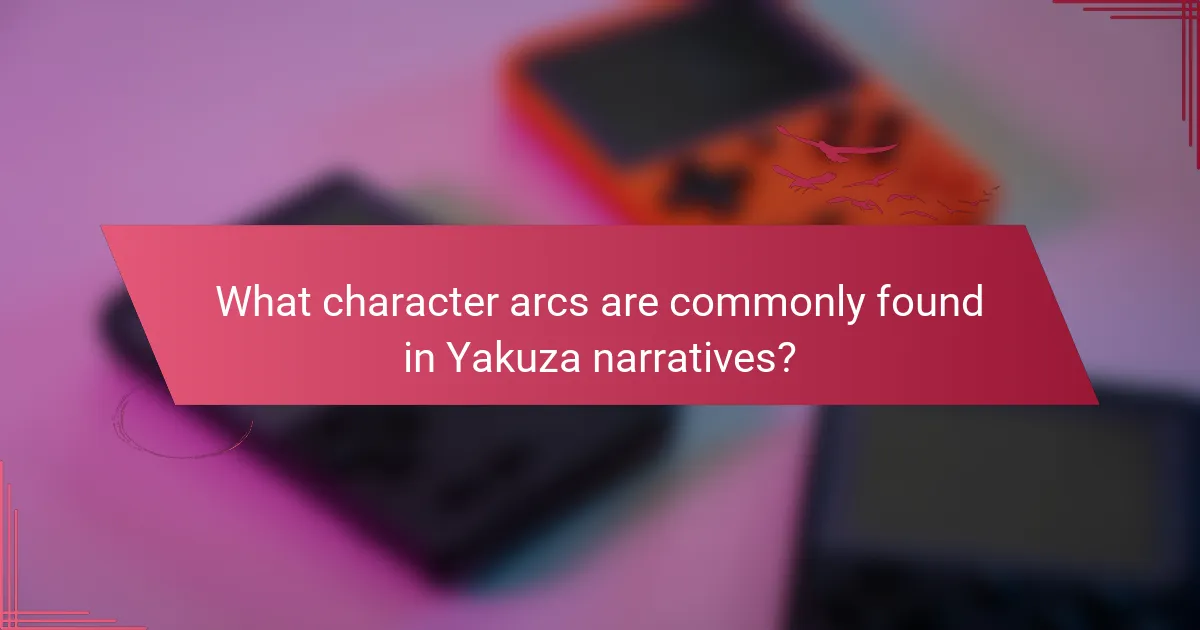Yakuza culture plays a crucial role in shaping urban life in Japan, influencing social dynamics and community identity. This article explores how Yakuza groups impact local economies and social hierarchies, the complexities of character arcs in narratives, and the cultural references that enrich these stories. Additionally, it examines the moral dilemmas faced by characters and how these elements reflect broader societal themes.

How does Yakuza culture influence urban life in Japan?
Yakuza culture significantly influences urban life in Japan through its impact on social dynamics, crime, and community identity. The Yakuza often engages in activities that shape local economies, such as providing security for businesses and participating in community events.
The presence of Yakuza groups can create a unique social hierarchy within neighborhoods, affecting how residents interact and perceive authority. In some cases, Yakuza members act as informal mediators in disputes, which can foster a sense of order and stability.
Cultural references to the Yakuza permeate Japanese media, influencing character arcs in films, literature, and video games. These portrayals often reflect the complexities of loyalty, honour, and the duality of their existence within society.
Additionally, the Yakuza’s aesthetic, including tattoos and fashion, has become a symbol of rebellion and identity, impacting urban fashion trends. This unique blend of influence shapes the cultural landscape of Japan’s urban areas.
What are the key elements of urban life depicted in Yakuza narratives?
Yakuza narratives depict urban life through themes of loyalty, crime, and social hierarchy. These elements reflect the complexities of city living in Japan. Character arcs often illustrate personal struggles against societal pressures. Cultural references highlight traditional values amidst modern challenges. The interplay of these factors creates a vivid portrayal of urban existence.
Which neighborhoods are significant in Yakuza stories?
Significant neighborhoods in Yakuza stories include Kamurocho, Sotenbori, and Nagasugai. Kamurocho serves as the primary setting, showcasing a vibrant nightlife and intricate character arcs. Sotenbori represents a contrasting cultural backdrop with its distinct atmosphere and unique attributes. Nagasugai, while less prominent, contributes rare narratives that deepen the overall urban experience in the Yakuza series.

What character arcs are commonly found in Yakuza narratives?
Yakuza narratives often feature character arcs centered around redemption, loyalty, and the struggle for power. Characters typically evolve through betrayal and personal loss, leading to complex emotional journeys.
Commonly, protagonists transition from criminality to seeking a better life. This root attribute highlights themes of morality and sacrifice. Unique arcs may involve characters grappling with their past while navigating the Yakuza’s rigid codes. Rarely, characters may experience a complete transformation, embracing peace over violence.
These arcs reflect broader cultural references, illustrating the tension between tradition and modernity in urban life. Overall, Yakuza narratives effectively explore the human condition through their multifaceted character development.
How do protagonists evolve throughout Yakuza stories?
Protagonists in Yakuza stories undergo significant transformations, reflecting personal growth and societal influences. Characters like Kazuma Kiryu evolve from naive ideals to complex individuals shaped by their experiences.
Throughout the series, protagonists face moral dilemmas that challenge their core beliefs. These conflicts often lead to a deeper understanding of loyalty, honour, and the consequences of their actions. For instance, Kiryu’s journey from a yakuza member to a protector of the innocent highlights this evolution.
Cultural references within the game further enrich character arcs. The interplay between traditional values and modern challenges forces protagonists to adapt, illustrating their resilience and depth. This dynamic mirrors real-life struggles within urban Japanese society, enhancing relatability.
Ultimately, Yakuza stories showcase protagonists who grow through adversity, embodying themes of redemption and personal responsibility. Their evolution resonates with players, making each character’s journey impactful and meaningful.
What common traits define Yakuza characters?
Yakuza characters commonly exhibit traits such as loyalty, honour, and a strong sense of family. They often navigate complex moral landscapes, balancing criminal activities with personal codes of ethics. Their character arcs frequently involve themes of redemption, sacrifice, and the consequences of their choices. Additionally, they are depicted as embodying traditional Japanese values while grappling with modern societal challenges.
Which supporting characters play vital roles in character development?
Supporting characters in “Yakuza” significantly enhance character development through their unique interactions and influence. For instance, characters like Goro Majima and Haruka Sawamura challenge the protagonist, fostering growth and emotional depth. Their distinct personalities and backstories create dynamic relationships that reveal the main character’s vulnerabilities and strengths. Additionally, these supporting roles often embody cultural references, enriching the narrative and providing context to the protagonist’s journey.

How do cultural references shape the Yakuza experience?
Cultural references significantly influence the Yakuza experience by shaping narratives and character development. These references create a rich backdrop that enhances storytelling. For instance, traditional Japanese folklore and modern media often intertwine, informing character motivations and conflicts. This blend offers a unique perspective on urban life, illustrating the complexity of loyalty and honour within the Yakuza. Additionally, references to historical events and societal issues add depth, making the characters relatable and their struggles more poignant. Ultimately, cultural references serve as a lens through which audiences understand the Yakuza’s role in contemporary society.
What traditional Japanese values are reflected in Yakuza narratives?
Traditional Japanese values such as honour, loyalty, and family are deeply embedded in Yakuza narratives. These themes shape character arcs and urban life portrayals. Honour, or “meiyo,” dictates characters’ actions and decisions, emphasizing reputation. Loyalty, particularly to family or clan, drives conflicts and alliances, reflecting the importance of social bonds. Additionally, the concept of “giri,” or obligation, influences character motivations, showcasing the moral dilemmas faced in a rapidly changing society. These values create rich narratives that resonate with cultural references, illustrating the complexities of life within the Yakuza.
Which pop culture elements are intertwined with Yakuza themes?
Yakuza themes are deeply intertwined with various pop culture elements, including video games, films, and anime. Video games like the “Yakuza” series showcase urban life and character arcs, exploring themes of honour and loyalty. Films such as “Tokyo Drifter” and “Sonatine” highlight the romanticized portrayal of Yakuza lifestyles. Anime, particularly “Baccano!” and “Durarara!!”, often reference Yakuza culture, blending it with supernatural elements. These narratives reflect a unique blend of tradition and modernity, emphasizing the complexity of character development within urban settings.

What are the moral dilemmas faced by Yakuza characters?
Yakuza characters face significant moral dilemmas, including loyalty versus personal ethics, the impact of violence on family, and the struggle for redemption. These conflicts often highlight the tension between duty to the gang and individual morality. Characters must navigate choices that challenge their values, leading to complex character arcs that reflect broader cultural themes. For example, a character may grapple with the consequences of their actions on innocent lives while remaining loyal to their code. Such dilemmas deepen the narrative, illustrating the multifaceted nature of urban life within Yakuza culture.
How do these dilemmas reflect societal issues?
The dilemmas in “Yakuza: Urban Life, Character Arcs, and Cultural References” highlight societal issues such as crime, loyalty, and economic disparity. These themes reflect the struggles individuals face within urban environments. Character arcs often depict the conflict between personal values and societal expectations. Cultural references serve as a lens to examine Japan’s historical context and its impact on modern life. This interplay reveals how individual choices are influenced by broader social dynamics, illustrating the complexities of urban existence.
What choices do characters make that define their arcs?
Characters in “Yakuza” make choices driven by personal values, cultural expectations, and survival instincts, shaping their arcs significantly. For instance, protagonists often grapple with loyalty versus ambition, impacting their relationships and decisions. These choices reflect broader themes of honour, redemption, and the complexities of urban life. Additionally, characters’ decisions may lead to transformative experiences, revealing their true selves and altering their paths. The interplay of these choices not only defines individual arcs but also enriches the narrative with cultural references unique to the Yakuza universe.

How is the portrayal of Yakuza evolving in modern media?
The portrayal of Yakuza in modern media is increasingly nuanced and diverse. Contemporary narratives often explore the complexities of urban life, depicting Yakuza members as multifaceted characters rather than mere villains. Character arcs frequently emphasize redemption, loyalty, and internal conflict, showcasing their struggles within a changing society. Cultural references have evolved, integrating traditional elements with modern themes, reflecting broader societal issues such as identity and morality. As a result, audiences gain a more comprehensive understanding of Yakuza culture and its impact on urban dynamics.
What are the trends in recent Yakuza-themed games and films?
Recent trends in Yakuza-themed games and films emphasize urban life, intricate character arcs, and rich cultural references. These narratives often explore themes of honour, loyalty, and the complexities of modern Japanese society.
Character development in these stories has grown more nuanced, showcasing diverse backgrounds and motivations. For example, protagonists often grapple with personal dilemmas that reflect broader societal issues.
Cultural references play a significant role, with many titles incorporating real-life locations, historical events, and traditional customs. This authenticity enhances immersion and connects audiences to the cultural landscape of Japan.
Moreover, gameplay mechanics in recent Yakuza games have evolved to include open-world exploration and interactive storytelling, allowing players to engage deeply with the urban environment and its inhabitants.
How do contemporary narratives challenge traditional stereotypes?
Contemporary narratives often subvert traditional stereotypes by presenting multifaceted portrayals of the Yakuza. These stories emphasize urban life, character development, and cultural references that challenge simplistic views.
For instance, modern depictions of Yakuza characters often showcase their complexities, revealing motivations rooted in loyalty and honour rather than mere criminality. This nuanced approach fosters empathy and understanding, contrasting with historical representations.
Additionally, contemporary narratives incorporate diverse cultural references, reflecting the evolving societal landscape. This inclusion broadens the scope of Yakuza stories, allowing for richer character arcs that resonate with wider audiences.
As a result, these narratives not only entertain but also provoke critical discussions about identity, morality, and the impact of societal expectations on individuals.

What are the emotional impacts of Yakuza stories on audiences?
Yakuza stories evoke deep emotional responses in audiences through their complex character arcs and cultural references. These narratives often explore themes of loyalty, honour, and sacrifice, resonating with viewers on a personal level.
The portrayal of urban life in Yakuza stories highlights struggles and triumphs, creating relatable situations that foster empathy. Characters often face moral dilemmas, allowing audiences to reflect on their values and choices.
Cultural references within these stories enrich the emotional experience, connecting viewers to shared histories and societal issues. This cultural grounding enhances the impact, making the stories more than mere entertainment; they become a lens through which audiences can examine their own lives.
Ultimately, the emotional depth of Yakuza narratives stems from their ability to intertwine personal struggles with broader societal themes, fostering a profound connection with viewers.
How do viewers relate to Yakuza character struggles?
Viewers relate to Yakuza character struggles through shared themes of loyalty, honour, and personal sacrifice. These characters often face moral dilemmas that resonate with audiences, reflecting real-life challenges. The complex narratives reveal the human condition amid urban chaos, fostering empathy. Additionally, cultural references deepen connections, as viewers recognize societal pressures mirrored in their own lives. This blend of relatable struggles and cultural context enhances emotional investment in the characters’ journeys.
What psychological themes are prevalent in Yakuza narratives?
Yakuza narratives prominently feature themes of loyalty, honour, and redemption. These psychological elements reflect the complexities of urban life and the characters’ struggles within their cultural context.
Loyalty often manifests in the relationships between characters, highlighting the sacrifices made for family and friends. Honour plays a crucial role, guiding characters’ decisions and actions, often leading to moral dilemmas. Redemption arcs are prevalent as characters seek to atone for past mistakes, showcasing their psychological growth.
Additionally, the narratives incorporate cultural references that deepen the psychological themes. For example, traditional Japanese values influence character motivations, emphasizing the weight of societal expectations. This interplay between personal and cultural identity enriches the storytelling, making the psychological themes resonate more profoundly with audiences.
What can audiences learn from Yakuza character arcs?
Audiences can learn about personal growth, moral dilemmas, and the impact of environment on character development through Yakuza character arcs. These narratives often showcase complex relationships and cultural nuances, reflecting urban life in Japan. Characters face challenges that reveal their true selves, illustrating themes of loyalty, redemption, and the consequences of choices. This depth fosters empathy and understanding of diverse perspectives within the Yakuza universe.
What are best practices for engaging with Yakuza narratives?
Engaging with Yakuza narratives involves understanding their complexity and cultural significance. Focus on character development, urban settings, and cultural references to enhance the experience.
1. Analyze character arcs to appreciate their growth and motivations.
2. Explore urban life portrayed in the narratives, reflecting real societal issues.
3. Recognize cultural references that provide depth and context to the stories.
4. Engage with the community through discussions and fan content to gain diverse perspectives.


